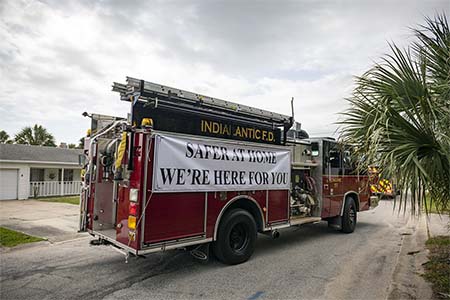by: Ross Owens, Applied Social Scientist, Science & Technology Directorate (S&T), Department of Homeland Security (DHS)
Learn about a new DHS project that looks to develop strategies that increase first responder resilience to pandemics.
The COVID-19 pandemic has placed enormous pressures on our country's first responders who risk exposure every day. As key workers within the homeland security mission, their safety and resilience in the face of unprecedented conditions is of utmost concern and urgency to DHS S&T.
To understand the challenges facing first responders, DHS S&T partnered with the University of Maryland's National Consortium for the Study of Terrorism and Responses to Terrorism (START) to conduct research on the impact of COVID-19 on public safety personnel. After interviewing 29 first responders representing 29 distinct agencies across 16 states, START summarized and published Phase 1 preliminary findings from the project “Monitor and Mitigate the Impact of COVID-19 on Public Safety.”
Significant preliminary findings
Maintaining morale and mental health of first responders is a significant concern.
First responders continue to experience fatigue, reduced motivation and productivity, and increased loneliness and isolation. Furthermore, while many agencies have existing resources for mental health support, interviews suggest only marginal increases in their use during the pandemic. Agencies may need to be more proactive in providing resources and asking personnel what is needed.
2-way communication and soliciting feedback promote better outcomes than top-down communication.
Specifically, 2-way communication can improve first responder morale, better protect personnel and communities through more thorough adoption of best practices, and reduce the burden on personnel and leadership often tasked with training and enforcing new policies.
Designating a COVID-19 coordinator or setting up a task force can still help agencies.
Even at this date, coordinators and task forces can communicate new guidelines, address employee questions and ensure that first responders stay up to date and be appropriately involved in vaccination plans.

Monitor and Mitigate the Impact of COVID-19 on Public Safety
The goal of this project is to measure the impact of COVID-19, identify and share best practices, and develop strategies to increase first responder resilience to pandemics and other disruptive public emergencies in the future.
Research-based findings
In addition to the preliminary research outputs, Second Sight Training Systems assisted START with data collection and analyses, conducting an extensive review of the scholarly literature. Their focus was on work that informs our understanding of how first responder organizations are affected by the COVID-19 pandemic, how they have responded to or were impacted by similar events in the past, and how they can provide services during new pandemics in the future.
Their final report includes 15 primary research categories, including issues such as:
- Preparedness.
- Occupational exposure and physical health.
- Staffing.
- Use of personal protective equipment and availability.
- Vaccinations and testing.
- Impacts on supply and demand for service.
The full report, abridged report and individual PDFs for each of the 15 topics are located on Second Sight Training Systems' COVID-19 Topic Dashboard for the First Responder Community.
Next project steps
Phase 2 of the project is now underway. We're conducting targeted interviews with first responders on themes that emerged during Phase 1. Additionally, in-depth staffing studies of a select number of first responder agencies will provide more nuanced information on how the pandemic has affected personnel, call volume and service delivery. These studies will focus on first responder agencies in Cary, North Carolina; Clark County, Nevada; and Los Angeles, with plans to include more as time and resources allow.
For more information or to get in touch with the researchers, please email the DHS program manager, Ross Owens.

